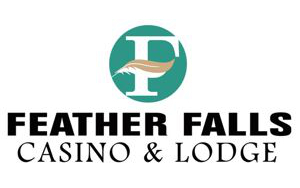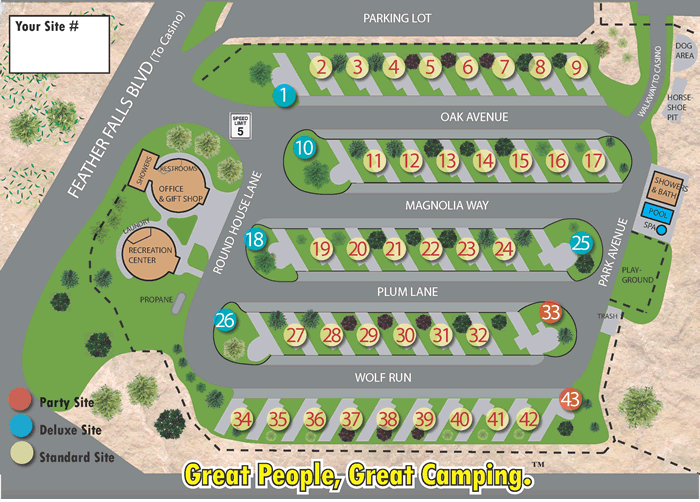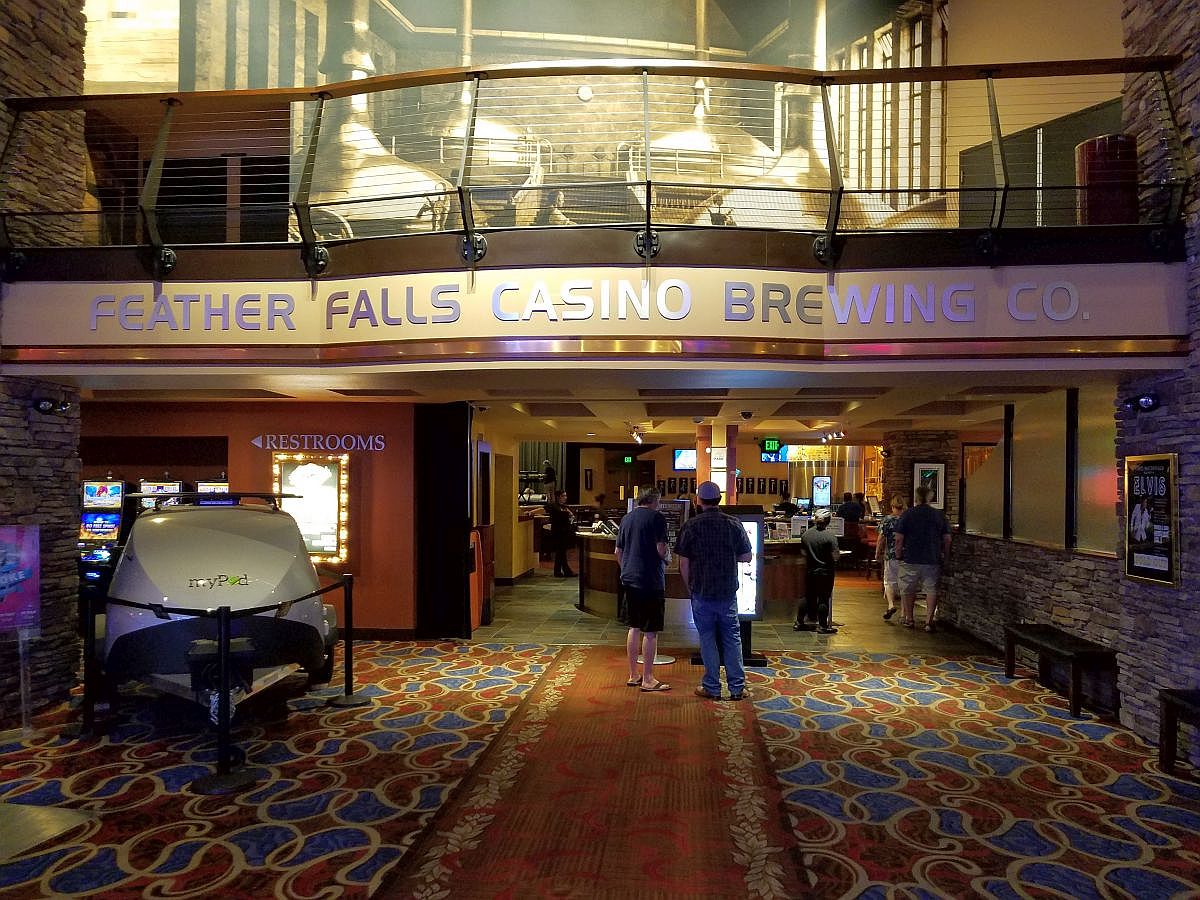Feather River Falls Casino
Posted By admin On 31/07/22Now $137 (Was $̶1̶5̶4̶) on Tripadvisor: The Lodge at Feather Falls Casino, Oroville. See 356 traveler reviews, 40 candid photos, and great deals for The Lodge at Feather Falls Casino, ranked #1 of 11 hotels in Oroville and rated 4.5 of 5 at Tripadvisor. Feather Falls Casino & Lodge is located in Oroville, California and owned by the Mooretown Rancheria of Maidu Indians. It opened in 1996. The current tribal-state gaming compact was signed by Gov. It authorizes Feather Falls Casino to operate up to 2,250 slot machines and any card or table games licensed in the state. Check Out All the Activities at the Feather Falls Casino! Feather Falls Casino Brewing Co. Welcome to the Oroville Chamber of Commerce. Check out 101 Things to Do in Butte County! Forebay Aquatic Center. Table Mountain Golf Course. Feather River Fish Hatchery. Specialties: We're California's Best Bet! Located in Oroville, Feather Falls Casino is one of the premier California casinos, offering round the clock gaming and dining, weekly entertainment, and one of the most comfortable hotel-casinos.
Feather Falls Brewing Company
To-Go options with curbside pickup are available.
LUNCH MENU (Opens in new window)
DINNER MENU (Opens in new window)
DESSERT MENU (Opens in new window)
Kick your hunger to the curb!
To-Go options with
Curbside Pickup.
Call in your to-go order to 530-534-4050, park in front of the Curbside To-Go sign, and let us bring a bag of deliciousness out to your car!
We offer this service daily from 11:00am – 8:30pm .
CURBSIDE MENU (Opens in new window)
* NO CASH TRANSACTIONS! *
For your convenience, we are now offering curbside pick up of select Cans and Bottles of Feather Falls Brewing Co beer available with your food purchase!*
Must be 21+ and have a valid ID. Beer must be purchased with food. All alcohol is to be consumed off property, and must be placed in your trunk upon pickup.
6-Packs:
- Soaring Eagle – $8.69 +CRV
- Naughty Native – $8.69 +CRV
- Volcano Mudslide – $8.69 +CRV
- Dancing Trees – $8.69 +CRV
- Raging Raptor – $8.69 +CRV
- California Haze – $11.99 +CRV
22oz Bottles:
- Soaring Eagle – $2.89 +CRV
- Naughty Native – $2.89 +CRV
- Volcano Mudslide – $2.89 +CRV
- Dancing Trees – $2.89 +CRV
- Snake Eyes – $3.89 +CRV
*Alcoholic beverages that are packaged by this establishment are open containers and may not be transported in a motor vehicle except in the vehicle’s trunk; or, if there is no trunk, the container may be kept in some other area of the vehicle that is not normally occupied by the driver or passengers (which does not include a utility compartment or glove compartment (Vehicle Code Section 23225)). Further, such beverages may not be consumed in public or in any other area where open containers are prohibited by law.
Beer Here!
Beer Here! Our bartenders will pour you a perfect pint of craft ale. AWARD WINNING CRAFT BEERS available in 22-oz. bottles or cans at a beverage outlet near you! CLICK HERE FOR LOCATIONS.
Soaring Eagle: Pilsner – Light in color and bitterness, this is an ideal craft beer to get mainstream bottle beer drinkers into a fresh, quality beer. 4 IBU and 4.25% ABV
Broken Arrow: IPA – A traditional IPA in color & very pale. It has a slightly sweet fruit and citrus hop flavor from big late hop additions in the boil and hopback, plus a generous amount of dry-hops in the fermenter. This beer is big on aroma without a bitter finish. 85 IBU and 6.5% ABV
Coyote Spirit: Amber Ale – Light-bodied with a deep blonde amber color. A lightly hopped ale with a delicate spicy bouquet and light roast character. 11 IBU and 4.25% ABV
Feather Falls Thunder: Apricot Wheat Ale – Lightly hopped to allow the featured sweet fruitiness of apricot to balance with smoothness of the wheat malt. 16 IBU and 4.25% ABV
Wild Warrior: Pale Ale – An American style pale ale brewed with North American hops and grain. Full bodied with a rich, light amber color and a balanced spicy flavor. 32 IBU and 5.25% ABV
Naughty Native: IPA – Full bodied with a deep amber color. It features bold flavors and aromas with complex citrus, pine and herbal characteristics. 3 kettle hop additions plus a generous dry hop addition are what gives it its bitterness and hop aroma. 50 IBU and 6.5% ABV
Dancing Trees: Hefeweizen – Unfiltered. Banana and clove esters are a result of the special hefeweizen ale yeast. A slightly sweet beer with a complex bouquet of flavors. 10 IBU and 4.5% ABV
Volcano Mudslide: Sweet Stout – Milk Stout, using non-fermentable lactose. It is full bodied with a deep dark color and a creamy foam head. 20 IBU and 6% ABV
Our Seasonals available throughout the year!
Bet on Black: Cascadian Dark Ale – Also known as a Black IPA, this deep brown ale is a cross between a Porter and an IPA. With a medium body, this highly hopped dark beer uses Cascade and Chinook hops from the Northwest for its aggressive piney and citrus flavors. Cold steeped dark malts give it a nice roasty balance with all the hops! 65 IBU and 8% ABV
Wild Billy: Winter Bock – A traditional German Bock beer with a deep amber color. It is lightly hopped with imported German and Czech hops, and features a rich malty finish. 22 IBU and 7.25% ABV
Grumpy Bear: Porter – A full bodied robust porter with a caramel malt sweetness and a small amount of black malt for a hint of burnt flavor, to balance a medium hop bitterness. 25 IBU and 5.5% ABV
Laughing Lion: Belgian Pale Ale – This copper-colored beverage has a fruity, moderately malty sweetness with a toasty, biscuity, nutty malt flavor. It’s a less bitter beer than its American counterpart, with a delicate noble hop flavor. Somewhat spicy, easy-drinking, with a sweet finish! 25 IBU and 4.5% ABV
Golden Feather: Extra Pale Ale -This refreshing beverage is a light, crisp ale with a light golden color and a nice Cascade hop finish. 23 IBU and 4% ABV
Emperor’s: Mandarin Wheat – An unfiltered wheat beer, with just a hint of hops to allow the fresh mandarin juice, to come through. 13 IBU and 4% ABV
Sticky Bee: Honey Wheat Ale – A light warm-weather beer brewed with locally produced honey from Sutter Buttes Honey Co. Balanced with Cascade and Nugget hops for a uniquely refreshing craft beer experience. 18 IBU and 4% ABV

Oktoberfest: Märzen – Characterized by a medium body, a malty flavor and a clean dry finish, this is our version of the traditional Oktoberfest beer originating in 16th century Bavaria. 23 IBU and 5% ABV
Snake Eyes: Double IPA – This beer is brewed as soon as the hop harvest happens to ensure the freshest hop flavor. There are 5 separate hop additions, including dry hopping. 80+ IBU and 8% ABV
Seasons: Cranberry Ale – A festive deep red ale that balances a blend of malted barley and hops with the tartness of fresh cranberry juice. A special beer just for the holidays. 28 IBU and 5.25% ABV
Live Bands
Entertainment is canceled until further notice.
Every Friday & Saturday! Must be 21 or older. For a complete list of featured shows, please see our entertainment schedule. CLICK HERE
Origin of Tribe
The Concow-Maidu of Mooretown Rancheria are descendants of ancient Northwestern Maidu who migrated to the foothills 25 miles east of Oroville in Butte County, California. The oldest verifiable occupation through scholarly and scientific research is about 1200 B.C. These people settled on the Mooretown Ridge, between the Middle Fork and South Fork of the Feather River, about 1500 B.C. when the Maidu language developed.
The Concow-Maidu were primarily a hunting and gathering people with a comprehensive knowledge of the uses of the local plants and animals for food, medicine, tools and clothing. They planted seeds and bulbs in their nearby gathering grounds which we would call gardens. They carried on an active trade with tribes from the coastal areas, the Nisenan territory, Northeastern California and Nevada. They had a highly developed social order of etiquette and religion that promoted a peaceful lifestyle.
White Contact and Indian Removal
The traditional Maidu boundaries were roughly from Mount Lassen and Honey Lake on the north to the Cosumnes River on the south, and from the Sacramento River on the west to the crest of the Sierra Nevada Mountains on the east. Early ethnographers divided this vast territory into three major areas based on certain language differences. These areas are the Northern or Mountain Maidu, mostly of Plumas County; the Northwestern or Concow-Maidu of Butte County and parts of Yuba and Sutter Counties; and the Southern Maidu or Nisenan, generally south of the Yuba River and extending to the Miwok lands.
Earliest contact with Europeans would have occurred during the twenty years while California was part of the Spanish holding and fur trappers constantly explored the Northstate’s waterways. There is a persistent story of a Spanish document, dated 1542 or 1559, being found in the hollow of an oak tree on the Middle Fork. However, the earliest recorded Concow contact was with Gabriel Moraga in 1800. Trapping greatly increased in the 1820’s and 1830’s. Many strange diseases were introduced and along with the many killings and massacres of Indian villages, the California Indians declined from 310,000 to 20,000 during the years 1700 to 1900.
When gold was discovered in 1848, many foreigners swarmed into Concow territory, and the Indians had to get out of the way. As gold fever wore off, these intruders began appropriating more lands for timber, agricultural and commercial ventures, particularly railroading. The U.S government negotiated treaties with tribes, promising many benefits in exchange for the homelands, but none were ever honored, and the Native Americans were left landless and homeless. Reservations were established and the Concows were forcibly moved out of their ancestral homes. Many died or were killed along the way to these distant, hostile places. For example, one group of 461 Concows left Chico on September 4, 1863, but only 277 survived the two-week trip to Round Valley.
Original Properties
Public outcry over the U.S. mistreatment of Native Americans led to the Rancheria Act of 1884. In June 1894, James T. Grubbs relinquished 80 acres of his holdings for the use and benefit of the Indians and their families from seven to twelve in number. Their settlement of four small cabins sat in the center of about eight usable acres, the remainder of the 80 acres being very rough and poor. They had lived there over 50 years and had planted fruit trees and cultivated gardens.
In 1915 the BIA purchased another 80-acre parcel to the east for 53 members of the Frank Taylor band of Indians, all named on a census list.
In 1924, Native Americans were granted citizenship and allowed to vote. In 1928, the Jurisdiction Act gave them the right to sue the U.S. From then until the present time, Indians have been trying to obtain redress for the wrongs done to them and the loss of their lands. In 1951, a land claim was filed for three California Indian groups against their wishes, and payment was distributed in December 1972, based on the 1853 land price of 47¢ per acre! The Mooretown Rancheria was terminated in 1958, effective August 1961.
Tillie Hardwick Reorganization

Feather River Falls Casino
In October 1979, a Pomo woman, Tillie Hardwick, and six named plaintiffs filed a class action suit on behalf of 34 illegally terminated rancherias, including Mooretown. On December 22, 1983, Mooretown and 16 others were reinstated and restored to Federal status.
In 1987, the U.S. government again was attempting to solve its budgetary problems by reducing services to Indians. Certain types of services would be given only to members of a federally-recognized tribe. In August, a general meeting of Mooretown descendants was held and the decision to reorganize was unanimous. A new Tribal Roll was started and a Tribal Council election was scheduled for October. A Tribal Constitution was adopted in November. Grants were sought and with the awards the Tribal office opened in June 1988.
Feather River Falls Casino Oroville Ca
11 Years of Progress
Many beneficial programs were instituted in the ensuing years, but critical needs existed to establish a new land base for housing and to qualify for better programs. An exhaustive search for suitable land finally ended in late 1989. On February 6, 1990, the Tribe signed a contract to purchase 203 acres of land in the Mesilla Valley, adjacent to the historic Pence Ranch an area notorious as the gathering point for the “Maidu Trail of Tears” of 1853. HUD approved the building of 50 houses, and funds were allocated for the first 20 in 1991.
However, the land posed several environmental problems that would have taken too much time and money to correct. The land search was renewed and a suitable parcel of almost 35 acres just south of Oroville was purchased in January 1992.

It was hoped that this milestone would give Tribal members a renewed sense of community and, with time, an appreciation for their cultural identity. Fifty houses have been built along with a spacious Community Center, which houses Tribal offices, a library, day care center and an after school classroom, plus a large multi-purpose room and a commercial quality kitchen.
The Tribe’s financial future improved with the opening of the modular Feather Falls Casino in 1996. A two-story, 32,000 square foot permanent casino building was completed and the grand opening celebration was held on February 13, 1998. It was highlighted by a spectacular 15-foot waterfall as the center attraction near the entrance.
Cultural Preservation

A major step in this direction was an award of seed money from the National Park Service to begin a tribal Mooretown Heritage Project. Over the course of the first year, in order to develop a Tribal Heritage Manual, hundreds of hours were spent and thousands of miles were traveled in order to locate and collect material specifically related to Mooretown and its members’ ancestors. All pertinent materials gathered were placed in the new Tribal Library.
Feather River Falls Casino Oroville
Hundreds of photos of people, places and artifacts were located and with adequate time and money, duplicates can be obtained in the future. The Tribe is developing a Tribal Cultural Preservation Ordinance in order to determine how to best collect, preserve and protect its dwindling cultural resources. Cemetery vandalism is still a great concern. A Cultural Resource Committee has been established and is in the process of developing a plan to set priorities and obtain funding for the vast array of issues waiting to be addressed.
Feather River Falls Casino Oroville

Feather River Falls Casino
A survey of the Tribal members received a 98% response, and the vast majority expressed a desire to learn the Concow-Maidu language. Many linguists, scholars and interested individuals have spent literally years of their lives in order to record, transcribe and preserve the Concow language. The Tribe must persevere in its efforts to obtain funding for a Concow Language Program, thus making it possible for members to achieve this vital link to their heritage. A beginning effort was the Concow Language Preservation Conference held on November 15 & 16, 1997. As with all groups through history, people need to know their past in order to know how to deal with the present and plan the future.
Produced by the CULTURAL PROGRAMS OFFICE of
Mooretown Rancheria , #1 Alverda Dr., Oroville, CA 95965
Phone (530)533-3625 , Fax (530)533-3680